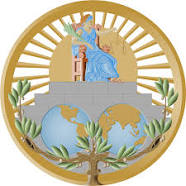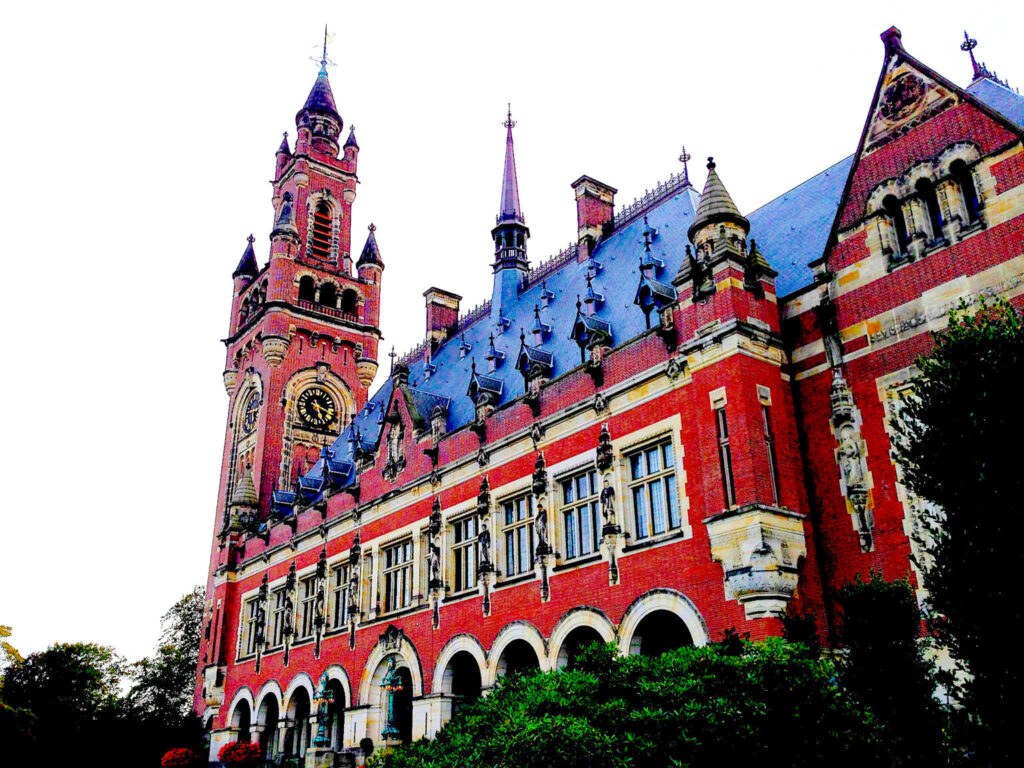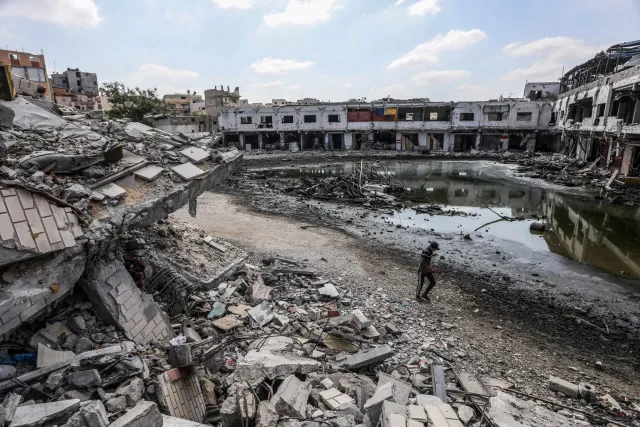Legal Consequences of the Policies and Practices of Israel in the Occupied Palestinian Territory and East Jerusalem
UNITED NATIONS, 22 Jul 2024
International Court of Justice ICJ – TRANSCEND Media Service
19 Jul 2024 – The International Court of Justice has today given its Advisory Opinion in respect of the Legal Consequences arising from the Policies and Practices of Israel in the Occupied Palestinian Territory, including East Jerusalem.
It is recalled that, on 30 December 2022, the General Assembly of the United Nations adopted resolution A/RES/77/247 in which, referring to Article 65 of the Statute of the Court, it requested the International Court of Justice to give an advisory opinion on the following questions:
“(a) What are the legal consequences arising from the ongoing violation by Israel of the
right of the Palestinian people to self-determination, from its prolonged occupation,
settlement and annexation of the Palestinian territory occupied since 1967, including
measures aimed at altering the demographic composition, character and status of
the Holy City of Jerusalem, and from its adoption of related discriminatory
legislation and measures?(b) How do the policies and practices of Israel referred to . . . above affect the legal
status of the occupation, and what are the legal consequences that arise for all States
and the United Nations from this status?”
In its Advisory Opinion, the Court responds to the questions posed by the General Assembly
by concluding that:
- the State of Israel’s continued presence in the Occupied Palestinian Territory is unlawful;
- the State of Israel is under an obligation to bring to an end its unlawful presence in the Occupied Palestinian Territory as rapidly as possible;
- the State of Israel is under an obligation to cease immediately all new settlement activities, and to evacuate all settlers from the Occupied Palestinian Territory;
- the State of Israel has the obligation to make reparation for the damage caused to all the natural or legal persons concerned in the Occupied Palestinian Territory.
Reasoning of the Court
After concluding that it has jurisdiction to render the requested opinion and that there are no
compelling reasons for it to decline to give an opinion (paras. 22-50), the Court recalls the general
context of the case (paras. 51-71) and addresses the scope and meaning of the two questions posed
by the General Assembly (paras. 72-83).
The Court then assesses the conformity of Israel’s policies and practices in the Occupied
Palestinian Territory, as identified in question (a), with its obligations under international law. In
particular, the Court’s analysis examines, in turn, the questions of the prolonged occupation, Israel’s
policy of settlement, the question of the annexation of the Palestinian territory occupied since 1967,
and Israel’s adoption of related legislation and measures that are allegedly discriminatory
(paras. 103-243).
With regard to the question of the prolonged occupation of the Occupied Palestinian Territory,
which has lasted for more than 57 years (paras. 104-110), the Court observes that, by virtue of its
status as an occupying Power, a State assumes a set of powers and duties with respect to the territory over which it exercises effective control. The nature and scope of these powers and duties are always premised on the same assumption: that occupation is a temporary situation to respond to military necessity, and it cannot transfer title of sovereignty to the occupying Power.
In the Court’s view, the fact that an occupation is prolonged does not in itself change its legal
status under international humanitarian law. Although premised on the temporary character of the
occupation, the law of occupation does not set temporal limits that would, as such, alter the legal
status of the occupation. Occupation consists of the exercise by a State of effective control in foreign
territory. In order to be permissible, therefore, such exercise of effective control must at all times be
consistent with the rules concerning the prohibition of the threat or use of force, including the
prohibition of territorial acquisition resulting from the threat or use of force, as well as with the right to self‑determination. Therefore, the fact that an occupation is prolonged may have a bearing on the justification under international law of the occupying Power’s continued presence in the occupied territory.
As regards Israel’s settlement policy (paras. 111-156), the Court reaffirms what it stated in its
Advisory Opinion on the Legal Consequences of the Construction of a Wall in the Occupied
Palestinian Territory of 9 July 2004, that the Israeli settlements in the West Bank and East Jerusalem, and the régime associated with them, have been established and are being maintained in violation of international law. The Court notes with grave concern reports that Israel’s settlement policy has been expanding since the Court’s 2004 Advisory Opinion.
As regards the question of the annexation of the Occupied Palestinian Territory (paras. 157-179), it is the view of the Court that to seek to acquire sovereignty over an occupied territory, as shown by the policies and practices adopted by Israel in East Jerusalem and the West Bank, is contrary to the prohibition of the use of force in international relations and its corollary principle of the non-acquisition of territory by force.
The Court then examines the question of the legal consequences arising from Israel’s adoption
of related discriminatory legislation and measures (paras. 180-229). It concludes that a broad array
of legislation adopted and measures taken by Israel in its capacity as an occupying Power treat
Palestinians differently on grounds specified by international law. The Court notes that this
differentiation of treatment cannot be justified with reference to reasonable and objective criteria nor to a legitimate public aim. Accordingly, the Court is of the view that the régime of comprehensive restrictions imposed by Israel on Palestinians in the Occupied Palestinian Territory constitutes systemic discrimination based on, inter alia, race, religion or ethnic origin, in violation of Articles 2, paragraph 1, and 26 of the International Covenant on Civil and Political Rights, Article 2,
paragraph 2, of the International Covenant on Economic, Social and Cultural Rights, and Article 2
of the International Convention on the Elimination of All Forms of Racial Discrimination.
The Court then turns to the aspect of question (a) that enquires as to the effects of Israel’s
policies and practices on the exercise of the Palestinian people’s right to self‑determination
(paras. 230-243). In this regard, the Court is of the view that, as a consequence of Israel’s policies
and practices, which span decades, the Palestinian people has been deprived of its right to
self‑determination over a long period, and further prolongation of these policies and practices
undermines the exercise of this right in the future. For these reasons, the Court considers that Israel’s unlawful policies and practices are in breach of Israel’s obligation to respect the right of the
Palestinian people to self‑determination.
Turning to the first part of question (b), the Court examines whether and, if so, how the policies
and practices of Israel have affected the legal status of the occupation in light of the relevant rules
and principles of international law (paras. 244-264).
In this respect, the Court first considers that the first part of question (b) is not whether the
policies and practices of Israel affect the legal status of the occupation as such. Rather, the Court is
of the view that the scope of the first part of the second question concerns the manner in which
Israel’s policies and practices affect the legal status of the occupation, and thereby the legality of the
continued presence of Israel, as an occupying Power, in the Occupied Palestinian Territory. This
legality is to be determined under the rules and principles of general international law, including
those of the Charter of the United Nations.
In this context, the Court is of the view that Israel’s assertion of sovereignty and its annexation
of certain parts of the territory constitute a violation of the prohibition of the acquisition of territory
by force. This violation has a direct impact on the legality of Israel’s continued presence, as an
occupying Power, in the Occupied Palestinian Territory. The Court considers that Israel is not
entitled to sovereignty over or to exercise sovereign powers in any part of the Occupied Palestinian
Territory on account of its occupation. Nor can Israel’s security concerns override the principle of
the prohibition of the acquisition of territory by force.
The Court further observes that the effects of Israel’s policies and practices, and its exercise
of sovereignty over certain parts of the Occupied Palestinian Territory, constitute an obstruction to
the exercise by the Palestinian people of its right to self-determination. The effects of these policies
and practices include Israel’s annexation of parts of the Occupied Palestinian Territory, the
fragmentation of this territory, undermining its integrity, the deprivation of the Palestinian people of the enjoyment of the natural resources of the territory and its impairment of the Palestinian people’s right to pursue its economic, social and cultural development.
The Court is of the view that the above-described effects of Israel’s policies and practices,
resulting, inter alia, in the prolonged deprivation of the Palestinian people of its right to
self-determination, constitute a breach of this fundamental right. This breach has a direct impact on
the legality of Israel’s presence, as an occupying Power, in the Occupied Palestinian Territory. The
Court is of the view that occupation cannot be used in such a manner as to leave indefinitely the
occupied population in a state of suspension and uncertainty, denying them their right to self-
determination while integrating parts of their territory into the occupying Power’s own territory.
In light of the foregoing, the Court turns to the examination of the legality of the continued
presence of Israel in the Occupied Palestinian Territory (paras. 259-264).
The Court considers that the violations by Israel of the prohibition of the acquisition of territory
by force and of the Palestinian people’s right to self-determination have a direct impact on the legality of the continued presence of Israel, as an occupying Power, in the Occupied Palestinian Territory. The sustained abuse by Israel of its position as an occupying Power, through annexation and an assertion of permanent control over the Occupied Palestinian Territory and continued frustration of the right of the Palestinian people to self-determination, violates fundamental principles of international law and renders Israel’s presence in the Occupied Palestinian Territory unlawful.
This illegality relates to the entirety of the Palestinian territory occupied by Israel in 1967.
This is the territorial unit across which Israel has imposed policies and practices to fragment and
frustrate the ability of the Palestinian people to exercise its right to self‑determination, and over large swathes of which it has extended Israeli sovereignty in violation of international law. The entirety of the Occupied Palestinian Territory is also the territory in relation to which the Palestinian people should be able to exercise its right to self-determination, the integrity of which must be respected.
The Court has found that Israel’s policies and practices referred to in question (a) are in breach
of international law. The maintenance of these policies and practices is an unlawful act of a
continuing character entailing Israel’s international responsibility.
The Court has also found in reply to the first part of question (b) that the continued presence
of Israel in the Occupied Palestinian Territory is illegal. The Court therefore addresses the legal
consequences arising from Israel’s policies and practices referred to in question (a) for Israel,
together with those arising from the illegality of Israel’s continued presence in the Occupied
Palestinian Territory under question (b), for Israel, for other States and for the United Nations
(paras. 267-281).
___________________________________________________
 The International Court of Justice (ICJ) is the principal judicial organ of the United Nations. It was established by the United Nations Charter in June 1945 and began its activities in April 1946. The Court is composed of 15 judges elected for a nine-year term by the General Assembly and the Security Council of the United Nations. The seat of the Court is at the Peace Palace in The Hague (Netherlands). The Court has a twofold role: first, to settle, in accordance with international law, legal disputes submitted to it by States; and, second, to give advisory opinions on legal questions referred to it by duly authorized United Nations organs and agencies of the system.
The International Court of Justice (ICJ) is the principal judicial organ of the United Nations. It was established by the United Nations Charter in June 1945 and began its activities in April 1946. The Court is composed of 15 judges elected for a nine-year term by the General Assembly and the Security Council of the United Nations. The seat of the Court is at the Peace Palace in The Hague (Netherlands). The Court has a twofold role: first, to settle, in accordance with international law, legal disputes submitted to it by States; and, second, to give advisory opinions on legal questions referred to it by duly authorized United Nations organs and agencies of the system.
Go to Original – scheerpost.com
Tags: Gaza, Genocide, International Court of Justice ICJ, Israel, Israeli occupation, Jerusalem, Palestine, Palestine Israel Apartheid Wall, United Nations, West Bank
DISCLAIMER: The statements, views and opinions expressed in pieces republished here are solely those of the authors and do not necessarily represent those of TMS. In accordance with title 17 U.S.C. section 107, this material is distributed without profit to those who have expressed a prior interest in receiving the included information for research and educational purposes. TMS has no affiliation whatsoever with the originator of this article nor is TMS endorsed or sponsored by the originator. “GO TO ORIGINAL” links are provided as a convenience to our readers and allow for verification of authenticity. However, as originating pages are often updated by their originating host sites, the versions posted may not match the versions our readers view when clicking the “GO TO ORIGINAL” links. This site contains copyrighted material the use of which has not always been specifically authorized by the copyright owner. We are making such material available in our efforts to advance understanding of environmental, political, human rights, economic, democracy, scientific, and social justice issues, etc. We believe this constitutes a ‘fair use’ of any such copyrighted material as provided for in section 107 of the US Copyright Law. In accordance with Title 17 U.S.C. Section 107, the material on this site is distributed without profit to those who have expressed a prior interest in receiving the included information for research and educational purposes. For more information go to: http://www.law.cornell.edu/uscode/17/107.shtml. If you wish to use copyrighted material from this site for purposes of your own that go beyond ‘fair use’, you must obtain permission from the copyright owner.
Join the discussion!
We welcome debate and dissent, but personal — ad hominem — attacks (on authors, other users or any individual), abuse and defamatory language will not be tolerated. Nor will we tolerate attempts to deliberately disrupt discussions. We aim to maintain an inviting space to focus on intelligent interactions and debates.

